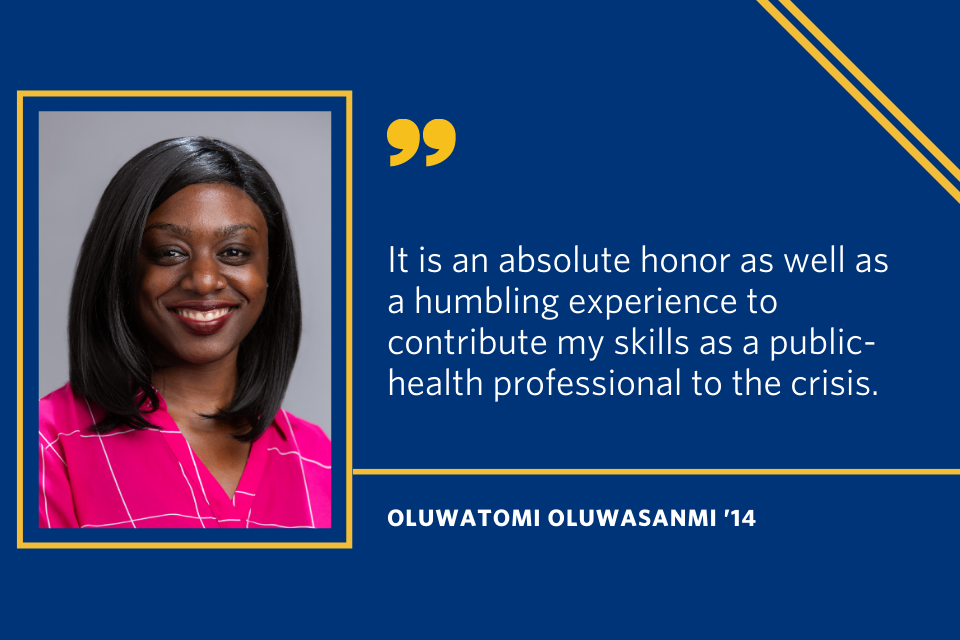Brandeis Alumni, Family and Friends
Oluwatomi Oluwasanmi ’14 on the Front Line Against Coronavirus

Oluwatomi Oluwasanmi ’14, who teaches an undergraduate course in epidemiology as an adjunct faculty member in public health at Hunter College in New York City, was recruited by the Centers for Disease Control and Prevention to work as an analyst for the CDC’s Quarantine Program in response to the COVID-19 epidemic in New York.
The Brandeis Alumni Association asked her to share her experience with the Brandeis community. She offered these comments in mid-July.
My responsibilities include screening incoming travelers from high-risk countries. This involves visual screenings and taking temperatures of potentially ill passengers. It can be challenging when an international passenger has limited English proficiency.
It is an absolute honor as well as a humbling experience to contribute my skills as a public-health professional to the crisis. I am very grateful for the opportunity to work with amazing healthcare personnel who are committed to managing the crisis via travelers’ health.
In New York, the public health crisis is getting slightly better. There are fewer patient hospitalizations for COVID-19 and for the most part, New Yorkers are adhering to social-distance practices and wearing masks. Clothing stores and small businesses such as beauty and nail salons have reopened. There are still long lines to enter grocery stores and no inside dining.
There might be some light at the end of the tunnel in NYC. However, this may change if there is an increase of international and domestic travel to New York and a reduction of social-distance practices.
For the most part, New Yorkers are banding together. However, some are acting as if the pandemic is over. Some are traveling domestically and attending functions like weddings and birthdays with large gatherings. A lot of bars and stores are bending or ignoring social-distancing practices.
The majority of older New Yorkers are wearing their masks to some extent. Since it is very hot, others feel very uncomfortable to take this preventive measure. For younger generations, many are still not wearing masks under the assumption that they are “untouchable.”
On the subway, there are essential workers who are adhering to social-distance practices. Commuters are wearing gloves, N95 and surgical masks. There is not much in the way of entertainment, with few break dancers, instrumentalists, or singers on the trains or in subway stations.
Activity at the airport is very limited. There is a slight increase in travel but the majority of restaurants still remain closed, except for a few fast food places.
God, my family, close friends, colleagues and students are helping me to stay motivated and focused. I will remember Summer 2020 in New York as the season that confirmed my life’s purpose: to pursue a public health career in epidemiology.
Here are some tips on how to stay safe and in good health during this public health crisis:
- Practice social distancing.
- Implement mental-health techniques that reduce levels of anxiety and chronic stress.
- Purchase or create masks.
- Stay in constant communication (phone call, text, zoom) with family and close friends.
- Pray and hope for better days to come.
Read additional reflections from Brandeis alumni on the front line in New York City.
Published On: April 19, 2020






